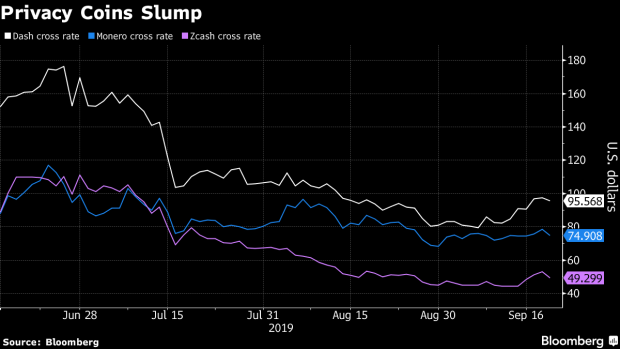Sep 19, 2019
Privacy Coins Face Existential Threat Amid Regulatory Crackdown
, Bloomberg News

(Bloomberg) -- The subset of digital assets dubbed privacy coins, which have long delighted libertarians and frustrated law enforcement, are feeling the pinch of a step up in regulation.
Cryptocurrencies such as Monero, Zcash and Dash, which can to varying degrees obfuscate transactions, are making it harder for exchanges and custodians to comply with fresh international guidelines to prevent illicit financing.
Some exchanges are finding it easier to delist the coins rather than figure out how to adhere to the additional risk management requirements. In August, Coinbase UK dropped support for Zcash. On Sept. 10, OKEx Korea said it’s delisting five coins -- Monero, Dash, Zcash, ZCache, Horizon and Super Bitcoin -- citing the Financial Action Task Force rules outlined in June.
“It’s certainly seen as creating a huge hurdle to the existence of privacy coins,” said Jesse Spiro, head of policy at Palo Alto, California-based crypto investigative firm Chainalysis Inc. He anticipates more exchanges will drop coins.
That’s already proving to be painful for a large slice of the crypto market, with Monero, Dash and Zcash having a cumulative market capitalization of about $2.5 billion. Monero’s price is down about 30% since mid-June, while Dash has slumped by more than 40% and Zcash has dropped by about 50%.
“There is a good chance many will be delisted and liquidity will dry up,” Jeff Dorman, chief investment officer at Arca, a Los Angeles-based asset manager that invests in cryptocurrencies, said in an email.
The privacy coins have long raised eyebrows. Europol has flagged Monero and Zcash, along with Bitcoin, for use in internet-based crime. Because they can be hard to trace, these coins could potentially be also used in terrorism financing or by sanctioned governments.
“It is possible to track some privacy coins, but there are certainly major road blocks that have been created by design,” Spiro said.
With Monero, for example, there’s no history of transactions that can be attached to a particular coin -- so it’s not possible to tell with certainty it’s never been used in crime. However, Monero also has a “view keys” feature, which lets owners monitor coin transactions, making it less of a “black box than often depicted,” Monero said in an email.
Developer teams behind Monero, as well as other privacy coins, say that they can be in full compliance with FATF’s rules.
“Dash is identical to Bitcoin and is 100% capable of meeting the requirements,” Ryan Taylor, chief executive officer at Dash Core Group Inc., said in an email. “At times, this requires some education as to why there are no legally definable differences between a Dash and Bitcoin transaction.” Dash has a PrivateSend option, which lets users break up coins into pieces and mix them with those of other participants, obscuring the origin of the funds used in the final transaction.
Taylor pointed out that while eToroX delisted Dash, the exchange reinstated it after Dash partnered with BlockchainIntel and Coinfirm to provide compliance services for the Dash blockchain, “and these services are able to provide the information regulators need.”
Zcash notes that it has a feature many other coins lack: The beneficiary and originator information is attached to every transaction, in compliance with FATF’s new travel rule, said Jack Gavigan, who is in charge of product and regulatory relations at Electric Coin Co., which supports Zcash.
“I believe it is compliant,” Gavigan said. “I believe it’s more compatible with FATF recommendations than most other cryptocurrencies out there.” Exchanges can require users to use transparent addresses in Zcash, asking users to not opt into its extra privacy features, he said.
“Regulators are playing catchup,” Gavigan said, saying the company has reached out to South Korean regulators to educate them on why Zcash is compliant.
The privacy coins are still popular with hardcore crypto enthusists, who say governments should take a hands-off approach to the coins, specifically designed to avoid their grasp.
“Do you think privacy is a fundamental right?” Zhao Changpeng, Binance’s chief executive officer, tweeted on Sept. 17 while announcing that the largest crypto exchange’s lending business will support Monero, Zcash and Dash. Binance is based in Malta, which is seen providing more accommodative regulation. Malta is a member of Moneyval, an anti-money-laundering mechanism in Europe that’s an associate member of FATF.
FATF will conduct a review of how its member countries are implementing the guidance in June 2020. Lack of compliance could lead to the closing of exchanges and penalties.
--With assistance from Nancy Moran.
To contact the reporter on this story: Olga Kharif in Portland at okharif@bloomberg.net
To contact the editors responsible for this story: Jeremy Herron at jherron8@bloomberg.net, Dave Liedtka, Brendan Walsh
©2019 Bloomberg L.P.





